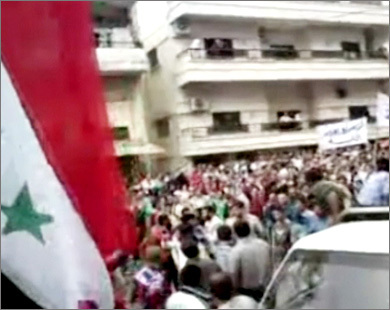Syria seeks 'national dialogue', frees prisoners
AFP
DAMASCUS- Syrian President Bashar al-Assad Wednesday launched a "national dialogue" while freeing hundreds of political prisoners in an amnesty opposition groups and Washington say does not go far enough.
State television said Assad had set up a committee and charged it with "formulating general principles of dialogue that will open the way for the creation of an appropriate climate in which the different elements can express themselves and present their proposals."

"All parties should contribute to widening participation (in the political process), to the development of an electoral law and to a law on political parties," Assad said.
The opposition has previously dismissed calls for dialogue, saying that this can take place only once the violence ends, political prisoners are freed and reforms adopted.
The demand that prisoners be freed was partially met on Wednesday when, according to a rights activist, hundreds of detainees were released from prisons across the country under an amnesty declared by Assad on Tuesday.
"Hundreds of people have been released," said Rami Abdel Rahman, head of the London-based Syrian Observatory for Human Rights.
"Fifty of them are from Banias, including the 76-year-old poet Ali Derbak," he added, but "thousands of political prisoners remain in jail and are to be released at any time."
Leaders of the communist Labour Party were unable to benefit from the amnesty as the decree excluded people convicted of joining "an organisation to change the social and economic status of the state," said Rahman, reached by telephone.
He also claimed that a civilian was killed Wednesday in Rastan, near Homs, where 20 corpses had been taken to hospital.
More than 1,100 civilians have been killed and at least 10,000 arrested since protests against Assad's autocratic government erupted in mid-March, human rights organisations say.
Washington, which has been upping the pressure by slapping sanctions on key regime members, said the release of "100 or so political prisoners does not go far enough."
"The release of some political prisoners is not the release of all political prisoners. We need to see all political prisoners released," State Department deputy spokesman Mark Toner told reporters.
"And we need to see an end to the violence that Syrian forces have been continually carrying out against civilian populations, and then we need to see meaningful movement towards reform," he said.
He also called on the Syrian government to engage the opposition "in a meaningful way and listen to their concerns and attempt to address them."
Toner added: "The gesture of releasing 100 or so political prisoners doesn't go far enough."
Syrian opposition groups meeting in Turkey on Wednesday to plan for Assad's demise also snubbed the amnesty offer.
The three-day gathering -- titled "Conference for Change in Syria" -- opened with the Syrian national anthem and a minute of silence for "the martyrs" killed in bloody crackdowns on street protests simmering in Syria.
Speakers said Assad's amnesty offer did not go far enough and came too late.
"We demanded this amnesty several years ago," said Abdel Razak Eid, an activist from the Damascus Declaration, a reformist group launched in 2005 to demand democratic change, "but it's late in coming."
Other international response to Tuesday's presidential decree was tepid at best.
French Foreign Minister Alain Juppe demanded "more ambitious and bolder" action from Syria. "I fear that it might already be too late," he told France Culture radio.
Turkey, while not dismissing the decree outright, also asked for deeper change.
Meanwhile, in Aleppo's central prison, a mutiny by its 7,000 inmates was quashed by security forces and the army Wednesday morning, according to Germany-based rights group Syrian Centre for the Defence of Prisoners of Conscience.
And Syria denied that a boy aged 13, whom opposition activists say died under torture, had been abused by security forces, labelling the accusations lies.
A medical report published by Syrian official media said three bullets killed teenager Hamza al-Khatib and that other apparent wounds on his body were due to decomposition, not security force brutality.
"The report closes the door on the lies and allegations and shows the truth," said the official news agency SANA.
The activists said the boy had disappeared since taking part in a demonstration in the southern region of Daraa on April 29, which he decided to join after police killed his cousin.
The UN Children's Fund (UNICEF) has said that at least 30 children have been killed by gunfire since the revolt began.
The government insists the unrest is the work of "armed terrorist gangs" backed by Islamists and foreign agitators.
---------------------------------------------------------------------------------